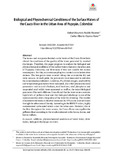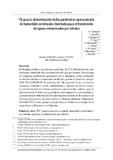Occurrence and toxicological relevance of pesticides and trace metals in agricultural soils, sediments, and water of the Sogamoso River basin, Colombia

Compartir este ítem
Fecha
2024Autor
Gallego J.L
Shipley E.R
Vlahos P
Olivero-Verbel J.
Citación
Metadatos
Mostrar el registro completo del ítemResumen
Historical pesticide use in agriculture and trace metal accumulation have long term impact on soil, sediment, and water quality. This research quantifies legacy and current-use pesticides and trace metals, assessing their occurrence and toxicological implications on a watershed scale in the Sogamoso River basin, tributary of the Magdalena River in Colombia. Organochlorine pesticides (22), organophosphates (7), and azole fungicides (5), as well as trace metals cadmium (Cd), chromium (Cr), copper (Cu), mercury (Hg), nickel (Ni), lead (Pb), and zinc (Zn) were analyzed in croplands and along the river. Toxic units (TU) and hazard quotients (HQ) were calculated to assess the mixture toxicity. Organochlorines were detected in 84% of soils, 100% of sediments, and 80% of water samples. Organophosphates were found in 100% of soil and sediment samples, as well as in 70% of water samples. Azole fungicides were present in 79% of soils, 60% of sediments, and in 10% of water samples. Total pesticide concentrations ranged from 214.2 to 8497.7 μg/kg in soils, 569.6–12768.2 μg/kg in sediments, and 0.2–4.1 μg/L in water. In addition, the use of partition coefficient (Kd) and organic carbon fraction (foc) allowed the distribution analysis for most of the pesticides in sediments, suspended particulate matter (SPM), and water systems, but not for soils. Concentrations of trace metals Cu, Zn, Pb, and Zn exceeded international quality guidelines for agricultural soils in 16% of the samples. Furthermore, Cu and Zn concentrations exceeded sediment quality guidelines in 50 and 90% of the samples, respectively. These findings demonstrate the broad distribution of complex mixtures of trace metals, legacy organochlorines, and current-use pesticides across the basin, indicating that conventional agriculture is a significant source of diffuse pollution. Sustainable agricultural practices are needed to mitigate adverse impacts on ecosystems and human health. © 2024 Elsevier Ltd
Colecciones
- Indexados Scopus [1893]
Ítems relacionados
Mostrando ítems relacionados por Título, Autor o Palabra clave.
-
Probabilistic landslide risk assessment in water supply basins: La Liboriana River Basin (Salgar-Colombia)
Hidalgo C.A; Vega J.A. (Springer Science and Business Media B.V.Ingeniería CivilFacultad de Ingenierías, 2021)Landslides are natural hazards that represent a huge economic burden and cause the loss of human life around the world. In countries such as Colombia, the mass movement events that cause the highest number of deaths and ... -
Biological and Physiochemical Conditions of the Surface Waters of the Cauca River in the Urban Area of Popayán, Colombia
Padilla Moreno, Rafael Mauricio; Ospina Parra, Carlos Alberto (Universidad de MedellínFacultad de IngenieríasMedellín, 2021-07-06)The homes and companies located on the banks of the Cauca River have altered the conditions of the quality of the water generated by residual discharges. Therefore, this paper proposes to analyze the biological and ... -
TIC para la determinación de los parámetros operacionales de humedales construidos diseñados para el tratamiento de aguas contaminadas por nitratos
Gallegos, Angel; Aguilar, Lorena; Campos, Isaac; Caro, Patricia; Sahuquillo, Santiago; Pérez, Carlos; Arias, Carlos Alberto; Montoya, Jorge; Morató, Jordi (Universidad de MedellínIngeniería AmbientalFacultad de IngenieríasMedellín, 2016-06-30)


